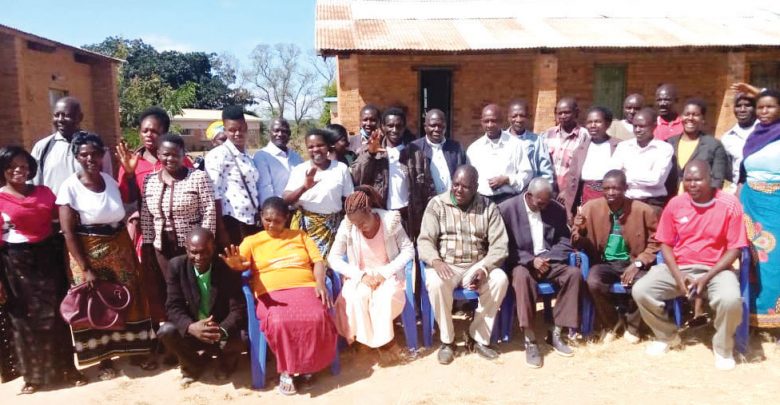Africa-Press – Malawi. In the deeply patriarchal and tobacco growing societies of Mzimba West, cases of men abandoning their families are not uncommon. Group Village Head Mwamba Jere of Mpherembe in the district explains that each and every harvesting season, the community registers cases of men dumping their families to enjoy the proceeds of their crops alone.
“We receive a lot of labourers mostly from the Southern Region to work in the tobacco farms. They usually come as a family – husband, wife and children. They work on the farms together as a family but when the tobacco is sold, the men disappear with the money leaving the wives and children destitute. They will never come back and that is also the end of the marriage.
“Others will get the money, squander it in town and come back with nothing. The woman at home will not even question, lest she is violently beaten,” he adds.
Jere says the resultant poverty in such cases becomes a driving force for young girls in those families to be married off as a means of survival. Worse still, they will be married to men they have never met before – immigrants that have overstayed in South Africa. Marriages are arranged by parents.
Community Policing Officer at Mpherembe, Elizabeth Msowoya, concurs with Jere, saying cases of abandoning families and wife battering have on several occasions been reported to her office domiciled at Senior Chief Mpherembe headquarters.
“We also get complaints about defilement but economic abuse cases and wife battering top the list, especially during a harvesting season like this. Families work together on the farms but husbands will not declare the proceeds to their wives and in some instances they just run away leaving the women and children with nothing,” she says.
A perceived hotspot for Gender-Based Violence (GBV), Mzimba is one of the six focus districts where the National Initiative for Civic Education (Nice) Trust is implementing a United Nations (UN) sponsored project called Elimination of Violence against Women and Girls through Transformative Civic Education under the Spotlight Initiative in Malawi. The others being Nkhatabay, Ntchisi, Dowa, Machinga and Nsanje
Spotlight Initiative is a global, multi-year partnership between the European Union and the UN aimed at eliminating all forms of violence against women and girls by 2030 in line with the Sustainable Development Goal number five which seeks to achieve gender equality and empower all women and girls.
The initiative is a response to all forms of violence against women and girls, with particular focus on domestic and family violence, sexual and GBV and harmful practices, femicide or killing of women, human trafficking and sexual and economic exploitation.
Nice Civic Education Officer for the North, Freency Mapanga, said they were concerned with the growing trends of structural violence against women and girls.
“All forms of violence against women and girls are a violation of their rights and at the same time retard the participation of women and girls in national development let alone their engagement in public life. The violence denies women and girls their developmental rights and must at all cost be eliminated,” Mapanga said.
By 2017, at least 34 percent of the women and girls aged 15 to 49 years in the country had experienced physical violence since the age of 15 and 21 percent of them had experienced sexual violence in their lifetime, information from the National Statistical Office shows.
Mapanga said more girls are dropping out of school owing to harmful cultural practices that lead to marrying off girls at a tender age, which further deepens the structural gender inequality between boys and girls.
According to UN findings, at least nine percent of girls in Malawi are married by 15 years while 46 percent are married by the age of 18, ranking Malawi as the 11th country globally with high cases of child marriages.
The country also ranks high in school dropout rate for girls in the Sub Saharan region. At least 62 percent of girls that enroll in Standard 1 proceed to Standard 5 but only 29 percent remain in school and proceed to Standard 8 due to marriage, pregnancy, and in some cases family responsibilities.
“Much as key drivers include attitudes that accept and tolerate violence against girls, poverty – especially for women and girls in the rural areas – has largely resulted in girls being married off to improve family finances,” she said.
“We intend to address these issues by targeting the structural causes of violence against women and girls such as societal attitudes and social norms which put women and girls at lower pedestal level.
“The other targeted cause is the high poverty levels among women and girls due to lack of economic empowerment and lack of their economic and social rights. These can be dealt with through promotion of gender equality which can be achieved through transformative civic education,” she said.
Her organisation is conducting various civic education and awareness campaigns targeting community structures and groups such as male champions, gender champions, men and boys groups, women groups, child protection groups, village and area development committees, among others.
Through the activities, Nice hopes to address gender inequality and discrimination against women which reinforce unequal power relations between women and men.
“When women have low status in their relationships and in society, men choose to enforce and enact their power over women and girls through violence.
“And we realise that the active involvement of men as allies is crucial if we are to see real and meaningful change in the lives of women and girls. We want to make men reflect on the benefits of violence free households where a woman is also greatly contributing to economic progression which entails less pressure on the men,” Mapanga said.
According to Gender Officer for Mzimba, Naomi Thamala, the project will help significantly in reducing cases of violence against women and girls in the district.
“This is a district where patriarchy and its associated practices are deeply entrenched. As an office, we get a lot of reports or complaints on such matters as defilement, neglecting children and wives, battering and early pregnancies amongst school going girls.
“The project has come at the right time and we are hopeful that it will save our women and girls from the harmful patriarchal practices in this area,” Thamala said.
Malawi is catergorised as having a high prevalence of violence against women and girls in the form of harmful cultural practices, gender and sexual violence and intimate partner violence. Regardless, few of the victims are said to be reporting their experiences hence the hope that the project will reverse the trend.






